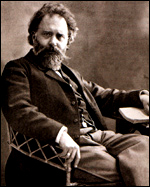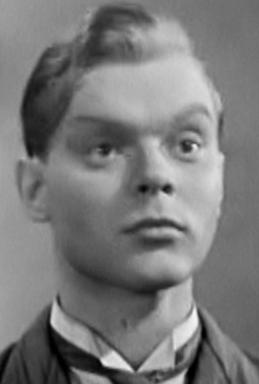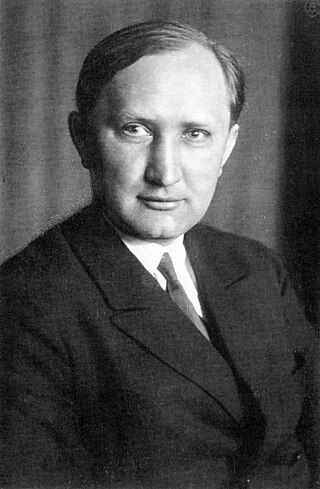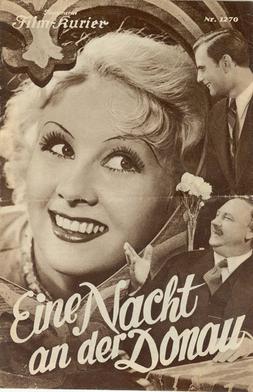Related Research Articles

Isang Yun, or Yun I-sang, was a Korean-born composer who made his later career in West Germany.

Emil Steinberger, commonly known as Emil, is a Swiss comedian, writer, director and actor. He is predominantly known as a comedian and actor in Switzerland, Germany and Austria. He has lived in New York City from 1993 to 1999, which inspired him for his book Emil via New York.

Eduard Adolf Strasburger was a Polish-German professor and one of the most famous botanists of the 19th century. He discovered mitosis in plants.
Carl Wilhelm, was a prolific German film director, film producer and screenwriter of the silent film era, at the end of which his career apparently entirely faded away and he vanished into obscurity.

Johann Peter Theodor Janssen was a German historical painter.

Gustav Theodor Fritsch was a German anatomist, anthropologist, traveller and physiologist from Cottbus.
Robert Emil Lienau was a prolific German music publisher.

Der Evangelimann is an opera in two acts by the Austrian composer Wilhelm Kienzl. The libretto, by the composer, is based on Leopold Florian Meissner's short story "Aus den Berichten eines Polizeikommissärs". It was adapted in 1924 as a silent film The Evangelist.

Hans Richter was a German film actor. He appeared in more than 130 films between 1931 and 1984, mostly in supporting roles. He was born in Brandenburg, Germany and died in Heppenheim, Germany.

Felix (von) Lichnowsky, fullyFelix Maria Vincenz Andreas Fürst von Lichnowsky, Graf von Werdenberg was a son of the historian Eduard Lichnowsky who had written a history of the Habsburg family.

Emil Bock was a German anthroposophist, author, theologian and one of the founders of The Christian Community.

Emil Beurmann was a Swiss painter, writer and poet.

Gustav Emil Devrient was a German actor and an occasional operatic bass.

Wedding at Lake Wolfgang is a 1933 German musical film directed by Hans Behrendt and starring Hugo Schrader, Gustl Gstettenbaur and Oskar Sima. Made at the end of the Weimar Republic it had release problems due to Nazi objections to the film's Jewish director.
Zebi Nasi Hirsch Prinz in German Heinrich Prinz, and later Rev. Christian William Henry Pauli was a convert to Christianity, missionary for the London Jewish mission, and Hebrew grammarian.

Ernst Roth was a music publisher for Universal Edition in Vienna and Boosey & Hawkes in London, and became the company's director in 1968. He also wrote about music and translated.

Die Weihe der Nacht, Op. 119, is a choral composition for alto, men's choir and orchestra by Max Reger, setting a poem by Friedrich Hebbel. He composed it in Leipzig in 1911 and dedicated it to Gertrud Fischer-Maretzki, the soloist in the first performance. It was published by Ed. Bote & G. Bock in Berlin the same year.

A Night on the Danube is 1935 German comedy film directed by Carl Boese and starring Olga Engl, Wolfgang Liebeneiner, and Gustav Waldau. It was shot at the EFA Studios in Berlin and on location in Budapest and Vienna. The film's sets were designed by the art directors Emil Hasler and Arthur Schwarz.
Peter Wackernagel was a German musicologist and librarian

The Battle of Hundheim took place during the Austro-Prussian War as part of the Campaign of the Main on 23 July 1866 between the combined forces of the Prussia and Saxe-Coburg and Gotha against the armies of Baden.
References
- ↑ The Concise Oxford Dictionary of Music Page 90 Michael Kennedy, Joyce Bourne - 2004 "Bote & Bock. Ger. mus. publishing firm, founded in Berlin in 1838 by Eduard Bote and Gustav Bock. Remained in Bock family until 1935 when it was reorganized as limited co. under direction of Robert Lienau, dir. of R. & W. Lienau."
- ↑ Die Musik in Geschichte und Gegenwart Volume 2 Friedrich Blume, Ludwig Finscher - 2007 "Gustav Bock war ein musikalisch sehr begabter und weitblickender Verleger, der für seinen Verlag wertvolle Werke, insbesondere auf dem Gebiet des Opernschaffens, erwarb."
- ↑ Henry-Louis de La Grange Gustav Mahler: A new life cut short (1907-1911) 2008 "When Eduard Bote withdrew from the business in 1847, the firm was run by Bock's brother Emil (1816-71) until 1871, ."
- ↑ Harald Kunz -125 Jahre Bote & Bock 1963 "Als sein Nachfolger wurde von Gustav Bocks Witwe der einzige Sohn des Firmengründers, der damals 23jährige Hugo Bock mit der Leitung ... Hugo Bock, am 25. Juli 1848 geboren, war erst fünfzehn Jahre alt, als sein Vater die Augen schloß."
- ↑ Berliner und Wahlberliner: Personen u. Persönlichkeiten in Berlin Volumes 1640-1914 Heinz Kullnick - 1961 "Nachfolger von Gustav Bock war sein Sohn Kommerzienrat Hugo Bock (t 1932), der den Weltruf der Firma begründet hat. Seit dieser Zeit befindet sich die Firma im Alleinbesitz der unmittelbaren Nachkommen von Hugo Bock."
- ↑ Harald Kunz 125 Jahre Bote & Bock 1963 "Gustav Bock war am 17. Juli 18 82 als Hugo Bocks erster Sohn nach den vier Töchtern Clara, Ellen, Wera und Fanny geboren und im patriarchalisch regierten Hause als „Kronprinz" begrüßt worden. "
- ↑ Music printing and publishing Donald William Krummel, Stanley Sadie - 1990 "Emil Robert Lienau (b Neustadt, Holstein, 28 Dec 1838; d Neustadt, 22 July 1920) studied philosophy and music under Moscheles and Rietz in Kiel and Leipzig. In 1863 he joined the publishing business of Schlesinger in Berlin,"
- ↑ "History of Boosey & Hawkes".